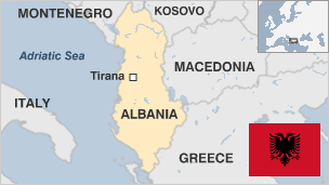
Facts and stats about Albania
Albania is one of the smallest countries in the Balkan Peninsula within the peripheries of South Eastern Europe. Majority of the population is made up of Muslims while the remaining 20 percent is divided between Orthodox Christians and Catholics.
The country boasts of an impressive shoreline, pristine beaches and the world-renowned BUTRINT National Park which is one of the UNESCO World Heritage sites. That is why the New York Times and Rough Guides (travel website) named Albania in the Top 10 Best Places to Visit for 2014.
Unfortunately, Albania is one of the poorest countries in Europe with an outstanding debt of 60 percent of the nation’s Gross Domestic Product in 2013. Furthermore, Transparency International, a graft supervisory body, published a report in 2012 that Albania was the most corrupt country in the EU during that period. Unemployment remains high while foreign investment is relatively minimal.
- Agriculture 122
- Background 11
- Conflict 4
- Cost of living 53
- Crime 106
- Culture 20
- Economy 2776
- Education 554
- Energy 757
- Environment 206
- Geography 82
- Government 203
- Health 296
- Import 4
3.01 million
Population. Ranked 137th in 2013.
$4,148.85
GDP per capita. Ranked 97th in 2012.

27,400 sq km
Sq. km. Ranked 138th in 2008.
Parliamentary elections were held in Albania in June of 2013. The Alliance for a European Albania obtained 57.7 percent of the votes or 84 out of 140 seats. This is a left-wing coalition headed by the Socialist Party of Albania. The new Prime Minister is Edi Rama who replaced Sali Berisha of the Democratic Party of Albania.
Albania is a small mountainous country along the Adriatic coastline. It is located near the borders of Greece, Kosovo, Macedonia, and Montenegro. It used to be one of the poorest countries in Europe and a victim of Communism’s isolationist regime. It has a predominant rural economy and most of its citizens have migrated to Greece and Italy as foreign workers. Due to five centuries of Ottoman rule, Albania has remained a patriarchal society.
However, the nation’s economy is expected to increase by 2.1 percent although public debt will grow to 74.8 percent of the Gross Domestic Product this year. This projection is based on the 2014 preliminary draft state budget which was submitted to the parliament for debate. This version of the fiscal package entails a modification of the taxation model which reduces the income tax rate on monthly salaries below a certain level. It also visualizes several measures to alleviate fiscal burdens on small enterprises and increase tax rates for large corporations. According to the World Bank, national debt can only be lowered through reforms in the energy sector, tax and pensions. The suggested government package is meant to enforce fiscal discipline to settle government debts and concentrate on investments.
The country’s foreign policy is centered on maintaining affable relations with all nations. It has memberships in 48 international organizations like the United Nations, North Atlantic Treaty Organization, Council of Europe, IMF, WTO, and the OIC.
jaacosta47 15 May 2014